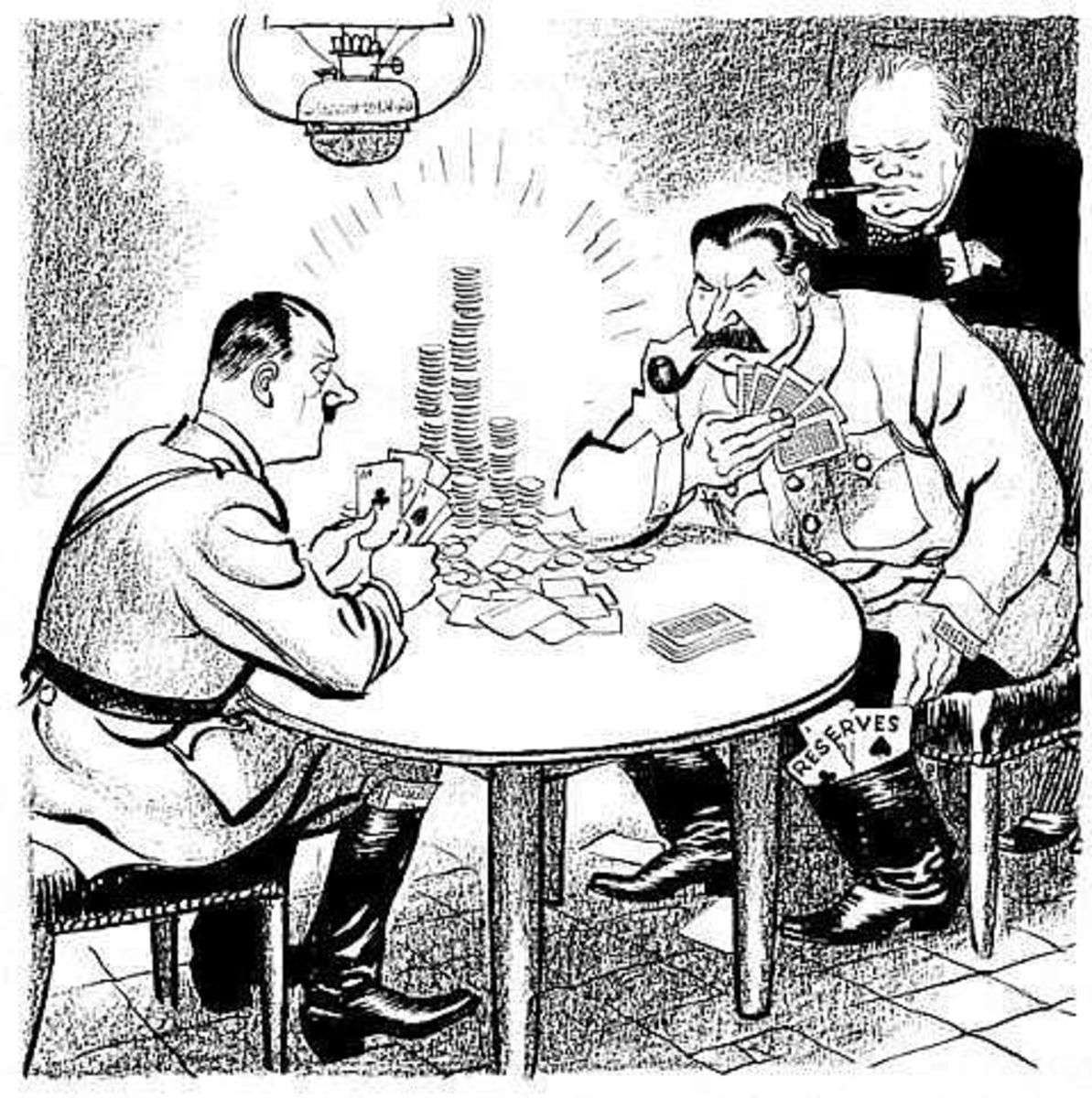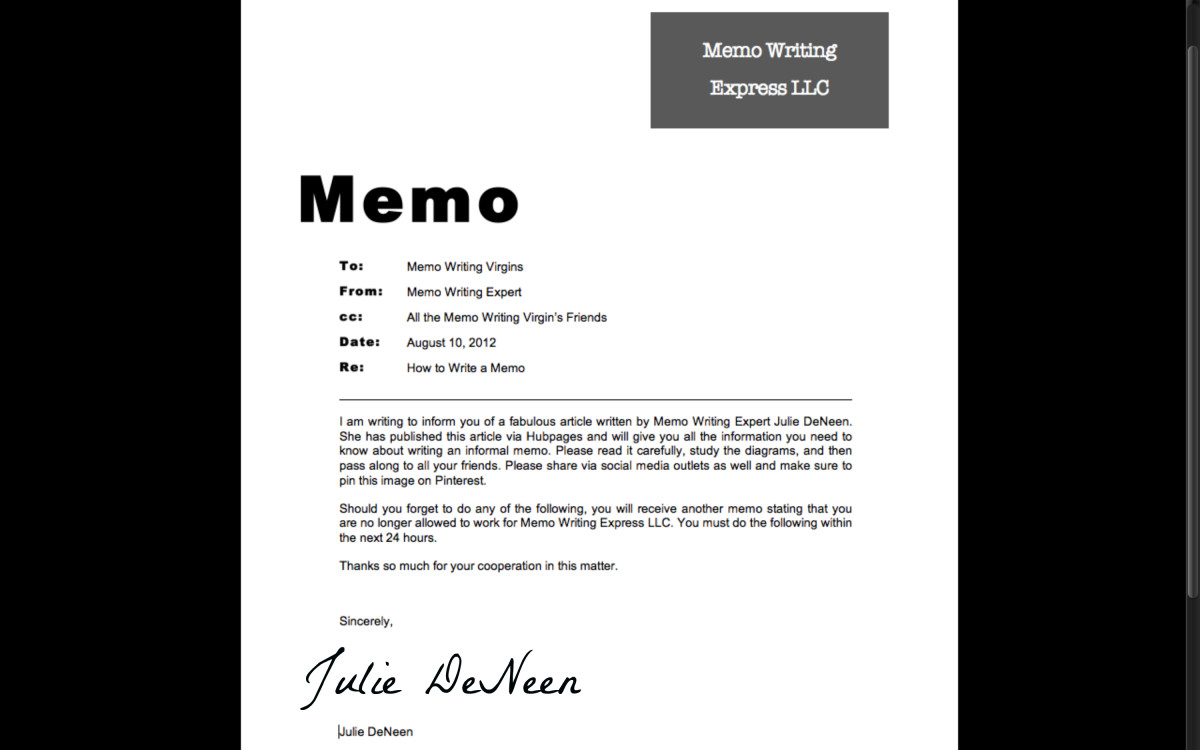50 Thoughts on Writing: Part 4
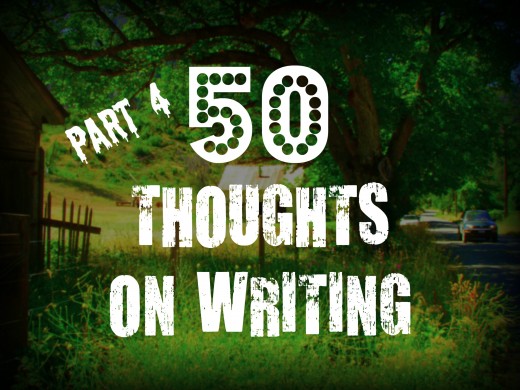
We're continuing on in this popular series. Here are parts 1-3 so you can catch up.
- 50 Thoughts on Writing: Part 1
50 rapturous thoughts, crumbles of advice, delectable quotes, and rambling ponderings on the craft of writing. - 50 Thoughts on Writing: Part 2
Part 2 of my series on writing. Be inspired to write your best! - 50 Thoughts on Writing: Part 3
Part 3 of my series on writing. Come one, come all for a free Creative Writing education.
31. Never, never, never give up. -Winston Churchill
If you feel that it, deep down in your soul, that you have been given the gift of writing—of communicating effectively—of transporting an audience into the great transcendence of time and space—then you also know that your gift is yours, and yours to bear. You must do it, or it will haunt you all your days. You have something special—something that no one can take from you.
Failure will come, it's what you do with it that counts. Consider these Winston Churchill quotes:
"“Never give up on something that you can't go a day without thinking about."
“If you're going through hell, keep going.”
“Success is not final...Failure is not fatal...it's the courage to continue that counts”
"Success is the ability to go from failure to failure without losing your enthusiasm."
32. Keep building your castles.

33. Failure means you're doing it right.
You feel the fire in your soul—you get that high when all of the words coming pouring into your fingertips. The world stops and you're caught up in an existential euphoria. Your heart beats faster, your thoughts come pouring in like a torrential rain, your whole body feel weightless in suspended animation. You have something to say, but your mind is moving father than your fingers. You start to sweat and think "what if I forget something? No, I can't stop now, I will forget. Must keep typing." And so that cruel mistress of words keeps you slaving away at your keyboard into the wee hours of the morning.
If the above is you, keep reading.
So if you have it—that sacred thing that no writer can adequately express in mortal words, you must continue at all costs. But, there will be failures and I do not mean that in a negative way.
Failure is a sign that you're doing something right.
“Develop success from failures. Discouragement and failure are two of the surest stepping stones to success.” -Dale Carnegie
I think that there are two reasons for failure:
1. You are not ready on a personal level.
Sometimes you might not be ready for it, and sometimes it's not ready for you. It's a divine way of making sure that you enter stage left at the right time.
Having had some recent success in screenwriting, I now look back on the person I was when I graduated college—when I wanted nothing more than to work in the film industry. I look back on my writing and see how much improvement has happened in 5 years. I can honestly say that I am a much better writer and screenwriter because of the time in between. On a personal level, life experience has given me thicker skin and a healthy perspective on the weird industry that is Hollywood.
2. You need to be refined by it.
Failure makes you better. Period. If you fail hundreds of times, you learn a couple hundred new lessons on how to get it right. It's like shooting a target with bird shot vs a slug: out of the hundreds of little balls of lead, a couple are bound to hit the bull's eye, even if you're no Annie Oakley. Think of it as: every time you fail you are increasing your chances of winning. If you are indeed a solid writer with a solid product eventually a fish will bite.
Your Turn
Do you have it--that thing we writer's can't explain--that obsessive drive to write?
34. Make your characters dance.
- Make Them Dance: A Guide To Writing Irresistible Fic...
Writing irresistible fiction starts with getting your characters out on the dance floor, upping the stakes, multiplying the consequences, and piling on the tension.
35. Time is your enemy.
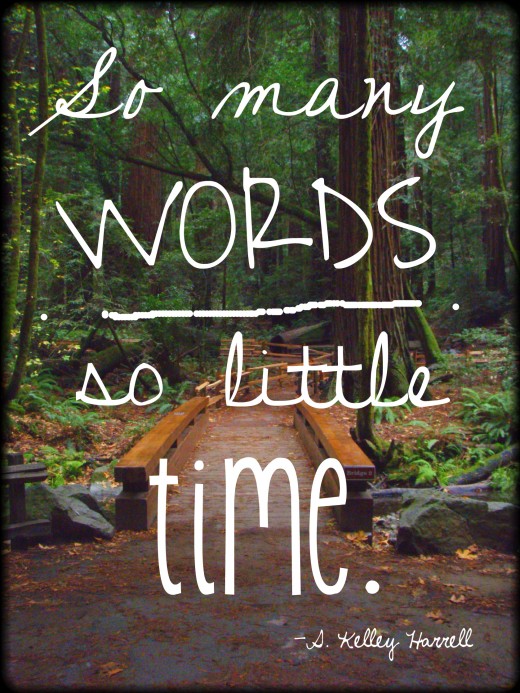
36. As a writer you are not preaching a sermon, you are entering a conversation. (Buckle up, this one is as long as a sermon).
You may have become a writer because you feel like you have something to say, which is one of the most important parts of being a writer—you have to be opinionated. However, you can be so passionate and zealous for your cause that you turn readers off because they can't relate to you.
You have to stand for something.
All art is a reflection of the human experience and your experience is unique and it matters. Writing is one facet of the Freedom of Speech that we hold so dear—and yes it is OK to take sides on a matter. After all. you may be the voice that stands for someone who can't speak for themselves.
Let's look at it from another angle: your triumph is a threat to the other side. By standing for something, you create an enemy who sees your work as an affront to their cause. This is where it takes discernment to tread lightly where you must and shout from the rooftops where you should.
I have always found it more profitable to enter a conversation than preach a sermon. This is done by engaging all sides in a dialogue. Maybe the other side has never looked at it through the same lens as you—maybe you've never looked through theirs. Your job is to tireless seek the truth, but be humble enough to realize that you could be wrong.
If You are Writing an Article
If you are writing an article on a charged topic, be sure to look at the topic from all angles. If possible, interview someone on the other side and try to figure out why they believe the polar opposite. They might even have a perfectly legitimate reason for thinking the way they do, even if its not one you agree with.
I think a good approach to take is to educate, not argue. Lay your ego aside and engage the other side without being dehumanizing. Respect them and respect their opinion, even if you disagree. Kill them with kindness and intellectual prowess. Pretend you are taking the other side out for a cup of tea and you merely want to discuss a topic because you want to understand it.
An Example
Some people believe that housing developments should have strict guidelines on exterior paint choices (let's call them the Neutrals). Others feel that their freedom is being trampled on and they want the ability to express themselves (the Colorfuls).
I truly don't have an opinion, but let's just say that I was passionate about being a Neutral. Here we go: my house has only ever been 12 shades of beige, I'm president of the homeowners association, and I feel that a development that has a similar look increases property values, makes the development look clean, pristine and uniform, and gives the development a sense of community. The Colorfuls are a threat to the value of my home and the feeling of neighborly community.
If I took the time to hear the other side out, I might discover this: the Colorfuls value freedom and originality; they want their house to stand out; they want their development to offer them amenities but not look exclusive; they want to be part of a city, not a development; they feel that because they own the land, that they should be able to decide what color they paint their house; they believe that it is no one's business what the outside of their home looks like; they don't like it that a select group of homeowners get to decide which color pallets are acceptable to the masses; they think that houses that look too similar are harder to sell because it's harder to stand out from the competition.
I can now write a well informed article on why I think Neutrals are morally and intellectually correct. A part of me empathizes with the Colorfuls, and the Colorfuls can sense it when they read my work. We both realize that we have differing objectives and values, but in our open dialogue, we have learned how to better understand, and possibly accommodate one another. We can walk away from a cup of tea with differing opinions but not feel like we're at war.
The truth is, hardly anything I say will likely convince the other side of my opinion. As a writer, what I can do, is respectfully present the facts, and see if any of the fish bite.
If You Are Writing a Story
Nothing turns off a reader more than when a fictional story feels like one long sermon. Believe me, audiences can sense when you are trying to shove propaganda down their throats. It's OK if your character is opinionated—it might even be an important character trait. However, don't use a character as a mouthpiece for your opinions. It needs to feel organic.
Your character shouldn't open his mouth and spout out an essay. Remember the show don't tell principle? Show your character's values by what they do. This is a little trickier when a story is in 1st person—if that's the case, then make sure that the reader doesn't feel that the author is speaking through the character.
It's OK to Write a Character With an Opinion that is Not Your Own.
In fact I highly recommend it. For one, all of your stories won't come off as too similar. You want your reader to keep guessing what the character will do next; you don't want your writing to become formulaic and predictable. You don't want your readers to have a "read one, read them all" feeling.
As a writer you stretch yourself when you write a character that you disagree with. This is especially profitable when writing an Antagonist. All Antagonists have a rational reason for doing what they do. It might not be moral, but it will always be grounded in a hint of truth.
One of the most fascinating examples of this is in the movie Skyfall, where the Antagonist is attempting to unleash mayhem on Britain because M had abandoned him to die years prior. He was a patriot to his country but became a terrorist because of feeling betrayed. It's actually kind of rational—and that's what makes it so frightening.
An example from my upcoming novel The Takeover; apologies for redundancy from Part 3, but I feel that this scene illustrates the point of not preaching but entering the conversation. One of these characters I highly disagree with, and I think I was effective if it's not apparently obvious.
Clint shoved a piece of white cloth down the barrel of his USP. It came out black. He repeated this process until, finally, the cloth came out white on the other end. He dabbed a little bit of oil on the end of the clean cloth and ran it through again.
Jules watched Clint’s intense focus as he tried to wipe away every morsel of burnt powder and grime off his gun. From Stan’s balcony, she had an unimpeded view of the ocean, but her gaze was transfixed on Clint’s strange pastime. He treated the gun with respect and cleaned it as if he were conducting an intimate ritual.
“Do you always spend an hour cleaning your gun?” she asked.
Without looking up from his work he said, “I guess I enjoy it. It’s relaxing.” He put a few drops of solvent on the metal slide and set it down. “Leftovers from my time in the military. They were pretty strict on cleanliness. It’s like diving, you take care of your gear, and it takes care of you. Your life depends on it.”
“I never thought of it like that.” She took a sip of her lemonade. “Have you ever killed someone, with a gun?” His silence, made her uneasy. “I hope that’s not too personal.”
Clint looked up at her. Her face was shy and innocent and he wanted to keep it that way. It was a personal question, but for him it was not a yes or no answer; it was more complicated than that. “Would you think any different of me, either way?”
“I don’t know.” She said. She looked out at the ocean, trying to bring light into the darkness of her memory. “I watched Tom shoot a man and then…” her voice went very quiet. “I watched Tom get shot. Then those men, they held a gun to my head. I have never felt so powerless.” Her eyes became watery and she wiped a tear from her cheek.
He picked up the polymer body of his gun and, taking a little brush, began gently brushing the grit off of the spring. “Did you think differently of Tom, after he shot the man?” he asked.
In the above story did you feel preached at?
37. Leave them satisfied with being unsatisfied.
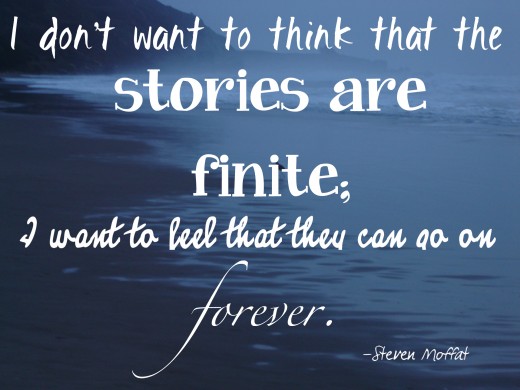
38. Ambiguity can be extremely effective.
I confess that I am a Chrisopher Nolan junkie. Seriously, it's borderline manic to stay up until 3 am every night for a week trying to figure out the hidden symbolism in his films. No really, I think I need a support group.
His latest film Interstellar has thrown me for a loop because I have come to realize that Nolan has a genius way of putting two different levels to his films: the obvious one you're shown, and the one you have to dissect.
In a recent interview with The Daily Beast, he is asked to interpret the ending to his film, to which he replies:
“No way, man! You’re just going to have to go back and see it again. It’s there for you to make what you make of it. People do always have radically different interpretations of things I put in there, but I know what I think and I don’t like it to have any more validity than the experience you have watching it.”
When you walk out of Batman and you have absolutely no idea if Batman would have voted for Obama—then the writer has done his job.

